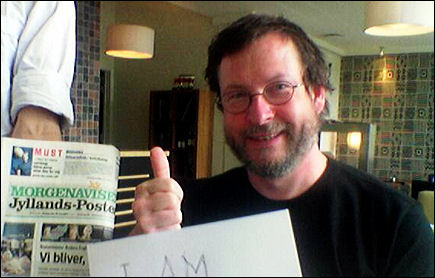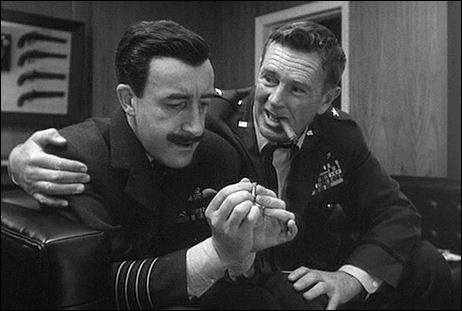A fairly nifty trailer for Ridley Scott‘s American Gangster.
Emnerald City in Iraq
Here’s an Iraq flick I’m 95% certain will kick ass: Imperial Life in the Emerald City, with Matt Damon playing a composite character “based on figures in Washington Post journalist Rajiv Chandrasekaran‘s book about chaos in Iraq, under Bourne Supremacy/Bourne Ultimatum/United 93 director Paul Greengrass.
Masters on Dina Lohan
I got into it briefly last August, and now someone else — Slate‘s Kim Masters — has focused on “mom-ager” Dina Lohan, the blonde Medusa behind Lindsay Lohan‘s fixin’-to-die tragedy. Mom, who seems an almost pure manifestation of evil, needs to check into a spiritual-rehab facility while her daughter deals with the substance thing.
“Reservation” vs. “Revolutionary”
Getting this straight: Terry George‘s Reservation Road, an emotionally intense adult drama set in Connecticut that’s based on a respected 1999 novel by John Burnham Schwartz, will open on 11.9.07 via Focus Features. Sam Mendes‘ Revolutionary Road, an emotionally intense adult drama set in Connecticut that’s based on a respected 1961 novel by Richard Yates, will open in December 2008 via DreamWorks.

Joaquin Pheonix, Jennifer Connelly in Reservation Road
George’s film, wrapped, costars Joaquin Phoenix, Mark Ruffalo, Jennifer Connelly and Mira Sorvino. Mendes’ film, now shooting in and around Darien, Connecticut, costars Leonardo DiCaprio and Kate Winslet.
Goldstein on marketing movie carnage
“The next time you see a Hostel: Part II poster, perhaps you’ll ponder for a moment why so many of us get a kick out of movies in which kids are gruesomely hacked to death yet
Paris Hilton is free
The L.A. County Sheriff’s department’s decision to release Paris Hilton after a lousy three days is a contemptible joke and utterly shameful. She was sent home after midnight with an ankle bracelet, which she’ll wear for 40 days. A Sheriff’s department spokesperson called it a “reassignment” and mentioned that a “medical” issue had been a factor in the decision to send her home. Medical? The message these LACS chumps have sent to the world is that super-rich ho’s with hot-shot attorneys skate, and that the staffers running the show are political bush-leaguers and totally compliant candy-asses.
Hilton, needless, to add, has completey failed the Robert Mitchum test that I spoke of on May 11th. Mitchum did time quietly and without complaint a following a shady marijuana bust in September 1948, and he came out of it smelling like a stand-up guy. Hilton slithered out of her 23-day sentence like a loftier-than-thou, over-pampered, morally bankrupt reptile.
My 5.11 item included this line: “I don’t think for a second that our very own empty-headed, barren-souled heiress has the character to ‘do a Mitchum,’ but the most potentially profound spiritual experience of her so-far-useless life awaits nonetheless.” I was right, actually — getting herself hustled out of jail after three days has been a profound spiritual experience in the most negative way possible. This is it — Hilton is finished. She had a chance to show some balls and fortitude and has showed she has absolutely none. Which famous woman has been more despised? Leni Reifenstahl?
The Big Ones
I’m re-pasting these with the assumption that I’m missing at least two or three that should be included (but aren’t). The 23 prestige fall-winter narrative films to watch for are Paul Thomas Anderson‘s There Will Be Blood, Alan Ball‘s Nothing Is Private, Susanne Bier‘s Things We Lost in the Fire, Tim Burton‘s Sweeney Todd, Joel and Ethan Coen‘s No Country for Old Men (seen it…brilliant), David Cronenberg‘s Eastern Promises, Marc Forster‘s The Kite Runner, Sam Mendes‘ Revolutionary Road, Paul Haggis‘s In the Valley of Elah, Gavin Hood‘s Rendition, James Ivory‘s City of Your Final Destination, Shekhar Kapur‘s The Golden Age, Lajos Koltai‘s Evening, Sidney Lumet‘s Before the Devil Knows You’re Dead, Mike Newell‘s Love in the Time of Cholera, Mike Nichols‘ Charlie Wilson’s War; Vadim Perelman‘s In Bloom, Robert Redford‘s Lions for Lambs, Ridley Scott‘s American Gangster, Michael Winterbottom‘s A Mighty Heart (seen it…a strong Michael Mann film), and Joe Wright‘s Atonement.
Eckler vs. Apatow
I tried to dig into Canadian author Rebecca Eckler‘s claim, published in MacLeans magazine, that director-writer Judd Apatow used some of the ideas and situations from her book, “Knocked Up: Confessions of a Hip Mother-to-be“, which came out in early ’05, to make his own Knocked Up. What I mean is that I tried to finagle a non-attributable spin from the Apatow/Universal camp, but the rulebook says to keep your yap shut when issues of this sort arise. The similarities are intriguing, but it’s hard to prove this stuff irrefutably.
Von Trier’s “The Boss Of It All”
Late last year director Lars von Trier (The Boss Of It All) spoke of being clinically depressed, but he’s out of it now. He’s confessed to Radar‘s Matt Thompson that “maybe my problem is that I talk too much…I’ve been through three months of depression in the last year, and for some reason everyone seems to think I’m in a straight jacket, which I’m not.”

He explains that The Boss Of It All, which has a very decent 86% positive Rotten Tomatoes rating, is “supposed to be like some of these comedies you make in America: The Shop Around the Corner, Bringing Up Baby, The Odd Couple…all these little talent films. Maybe not so sentimental. Those films were part of my childhood. I was always feeling very secure when I saw them. I was trying to find this mood in Boss of It All.
“It shouldn’t be like Naked Gun, where you’re supposed to laugh all the time. It should only be a little time where you can feel secure.”
Damon’s Bourne aversion
Due respect to Matt Damon and his not wanting to be saddled with the Jason Bourne franchise beyond the next and (he says) final entry, The Bourne Ultimatum, but he shouldn’t shut the door too hastily. I’ve loved the last two Bournes (aside from the excessively hyper editing of the Bourne Supremacy action sequences), and I don’t know anyone who doesn’t feel that the Bourne flicks are much more reflective of 21st Century anxieties and vibrations than the Bond films, including the very good Casino Royale. I’d be happy to see at least one or two more Bournes beyond the next one. Besides, Damon has a knack for choosing bombs (I thought he was over after The Legend of Bagger Vance, i.e, “Bag of Gas”) and needs a good commercial franchise to keep things steady.
Indifferent universe
“The most terrifying fact about the universe is not that it is hostile, but that it is indifferent. But if we come to terms with this indifference, then our existence as a species can have genuine meaning. However vast the darkness, we must supply our own light.” A well-known director (not Eli Roth) said this. Sometimes you come across a line like this and it just hits the right chord.
4K “Strangelove”
God, this sounds delicious! A restored 4K version of Dr. Strangelove: Or How I Learned to Stop Worrying and Love the Bomb will be digitally projected at Landmark’s new complex at L.A.’s Westside Pavilion, beginning on Friday, 6.15. There are few things more beautiful to the naked movieoing eye than exquisite, scratch-free, razor-sharp monochrome films, especially those from the ’50s and early ’60s when black-and-white delivered its greatest visual splendor. Technologically, I mean.

Sony’s restoration guy Grover Crisp has told the Hollywood Reporter‘s Carolyn Giardina that the 4K Strangelove will be “the closest you can get with current technology to showing the film as if you are seeing it in 1964 right off the camera neg.”
Giardina’s piece explains that 4K resolution contains four times more picture information than 2K, the standard for digital cinema, and that Sony is the only manufacturer that offers theaters a 4K projection system. Crisp said that 4K restoration work is being planned for such additional classics as From Here to Eternity and Easy Rider. Hey, what about Otto Preminger’s Anatomy of a Murder?

